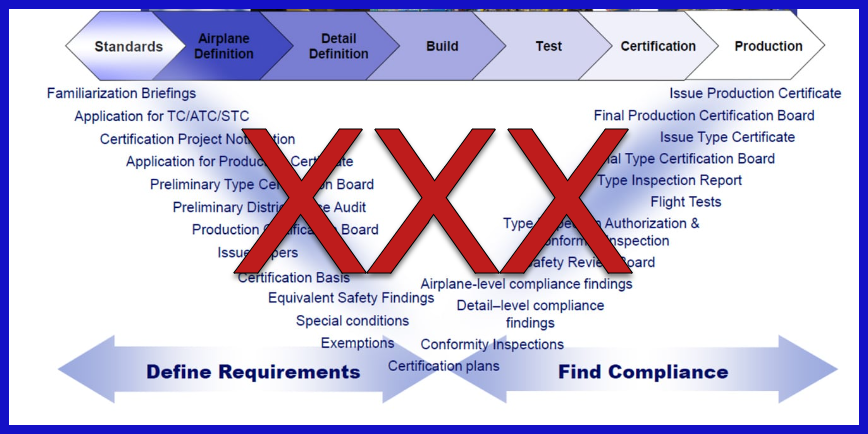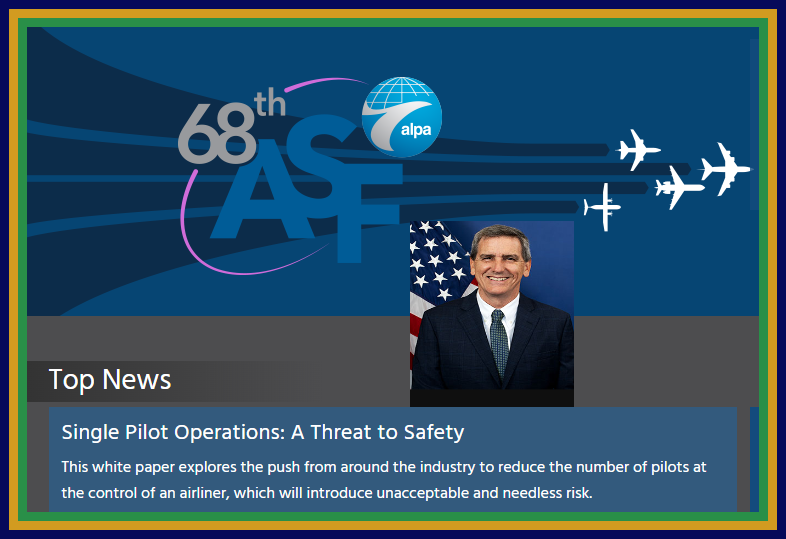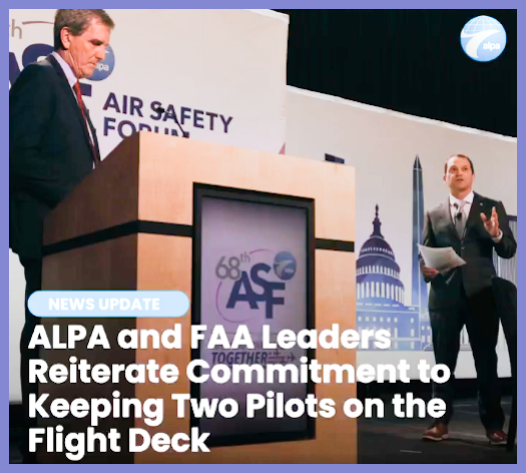FAA Administrator’s Declaration may require DISQUALIFICATION in all Cockpit Crew decisions!!!

At the 68th ALPA Air Safety Forum the FAA Administrator clearly earned brownie points from the union by pronouncing (see below Sean Broderick article)
“It’s the law of the land, and I INTEND FOR IT TO STAY THE LAW OF THE LAND.”
However, his absolute declaration may have disqualified him from participating in future requests by a TYPE CERTIFICATE APPLICANT and/or an AIR CARRIER to approve eMCO, SPO, RCO or a fully autonomous cockpit configurations.
The BLACK LETTER ADMINISTRATIVE principle sets a standard to assure that the deciding officials have NOT PREJUDGED THE MATTER:
If an official makes a statement indicating HE HAS already DECIDED the merits of a specific case BEFORE HEARING ALL THE EVIDENCE, this can disqualify him from participating.

Administrator Whitaker’s appointment lasts until October 27, 2028; so, this disqualification may not be applied if no applications are filed in the next 4 years.
Mr. Broderick’s article points to EASA has articulated a better position on this issue- instead of denying any form of reduced cockpit crew, it has set up two rule-making tasks to STUDY THE TECHNOLOGY AND ERGONOMICS issues presented by these possible options. The FAA has, instead, chartered a REDAC studying “develop a research plan to “be prepared with scientific data to support the processes for aircraft design and operational approvals.” That action was throttled back by the following statement:
“[It] is not the agency’s responsibility to develop or mature the science and technology to enable use of the emco concept, but the FAA needs to be ready to apply rigorous guidance and oversight once they are approached by a stakeholder looking to implement eMCO in commercial operations.” Being prepared to determine airworthiness, as the REDAC mission statement presents, cannot be construed to an assignment to develop EMCO. And yes, the FAA has invested millions of federal grants to research eVTOL, SST, new generation batteries and more emerging technologies!!!
ALPA’s dedication to preserving jobs in the cockpit dates from the 1960s when Boeing introduced the Pilot/Co-Pilot crew standard, an FAA safety approval opposed strenuously by the union. The removal of the B-727 flight engineer was supported by thorough ergonomics research and those findings have been proved by 60 years of 2 pilot crews of ever larger, more complex aircraft based on INCREASED AUTOMATION.

This current campaign, supported by almost constant social media, reuses the theme that ITS SAFETY AND NOT JOBS AT ISSUE. How can SAFETY be questioned when none of the technology has been fully defined; so any opinion is premature AT BEST? What is most perplexing is an airline pilot are trained to know all of the engineering aspects of the aircraft and to act on that detailed knowledge; YET they are willing to condemn this emerging technology before they are able to study what this continuation since the 1960s of automation entails.
This pattern recalls an 19th-century parallel movement, described by Britanica as follows:
LUDDITE, member of the organized bands of 19th-century English handicraftsmen who rioted for the destruction of the textile machinery that was displacing them.
The “Ludds,” or Luddites, were generally masked and operated at night. Their leader, real or imaginary, was known as King Ludd, after a probably mythical Ned Ludd. They eschewed violence against persons and often enjoyed local support..


FAA Chief Reiterates Agency’s Stance Against Reduced-Crew Operations

WASHINGTON—FAA leadership has NO INTENTION OF CHANGING the agency’s longstanding position that reduced crew operations (RCO) will not be permitted in updates to rules and guidance that currently mandate two pilots on the flight deck during all routine flight operations, Administrator Mike Whitaker said.
“It’s the law of the land, and I INTEND FOR IT TO STAY THE LAW OF THE LAND,” Whitaker told attendees of the 68th Air Line Pilots Air Safety Forum Sept. 11.
The FAA’s position stands in contrast to the European Union Aviation Safety Agency (EASA), which is STUDYING TWO CONCEPTS in response to requests from Airbus and Dassault.
In late 2023, EASA issued a rulemaking task on extended minimum crew operations, often referred to as RCO, which envisions permitting one pilot at the controls during “noncritical” segments of a flight’s cruise phase, the task’s summary explained. EASA has received at least one formal application from a manufacturer to approve the concept.
The rulemaking task focuses on operational changes that would permit only one pilot on the flight deck during specific scenarios.
The work, which gets underway with formal meetings later this year, could pave the way for pilots to sleep without being relieved by a reserve pilot—seemingly a cost-savings opportunity for airlines.
Manufacturers and operators see RCO as another fatigue-management tool. Some regulators allow one flight crew member to take a short rest on the flight deck while the other acts as pilot flying.
The FAA is not among them, however. The agency studied onboard napping 30 years ago, going as far as releasing a draft advisory circular that would have authorized it. But pushback from ALPA and other pilot unions helped stop the process. The agency’s official policy: Naps are fine so long as there are two pilots on the flight deck, not counting anyone resting. In-seat naps are not permitted.
The FAA’s most definitive step to date has been to agree with a Research, Engineering and Development Advisory Committee (REDAC) recommendation to develop a research plan to “be prepared with scientific data to support the processes for aircraft design and operational approvals for concepts such as Extended Minimum Crew Operations [eMCO],” the agency wrote in a formal response to REDAC in 2024.

“[It] is NOT THE AGENCY’S RESPONSIBILITY TO DEVELOP OR MATURE THE SCIENCE AND TECHNOLOGY TO ENABLE USE OF THE EMCO CONCEPT, but the FAA needs to be ready to apply rigorous guidance and oversight once they are approached by a stakeholder looking to implement eMCO in commercial operations,” the FAA wrote.
The agency added it is “in the process of focusing our safety research plans to emphasize key strategic thrust areas related to eMCO,” including focuses on automation and artificial intelligence.
“The resulting foundational knowledge will support many new concepts, including eMCO,” it added.
The work going on in Europe prompted ALPA to join forces with two other pilot groups, the European Cockpit Association and International Federation of Air Line Pilots’ Associations, in opposition.
OF GREATER CONCERN to the unions are longer-range plans to design flight decks for just one pilot. AIRBUS AND FEDEX have already broached a SINGLE-PILOT-OPERATIONS (SPO) idea for future freighters. But implementation would require new rules and changes to flight deck design—both of which will take years.
Proponents and critics have framed the debate as one about reducing labor costs by enabling fewer pilots to do the same amount of work. ALPA President Jason Ambrosi argues the issue has nothing to do with money.
“It’s not about jobs, it’s about safety,” Ambrosi said. “This is one of the biggest threats, if not the biggest threat, facing us now.”


Aviation Week Network https://aviationweek.com/air-transport/safety-ops-regulation/faa-chief-reiterates-agencys-stance-against-reduced-crew 1/2 Copyright © 2024. All rights reserved. Informa Markets, a trading division of Informa PLC.